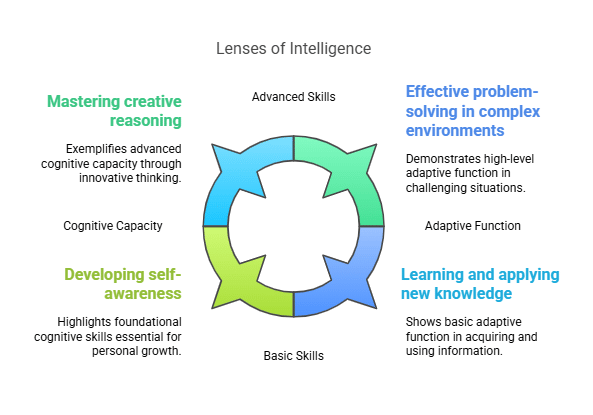Class 10 Exam > Class 10 Notes > Artificial Intelligence for Class 10 > What is Intelligence?
What is Intelligence? | Artificial Intelligence for Class 10 PDF Download
What is Intelligence?
Intelligence can be understood through various lenses:
- Cognitive Capacity: This includes logic, understanding, self-awareness, learning, emotional knowledge, reasoning, planning, creativity, critical thinking, and problem-solving skills.
- Adaptive Function: More broadly, intelligence is the ability to perceive or infer information and retain it as knowledge. This knowledge is then applied to adapt and function effectively within a given environment or context.

How it All Started?
Artificial Intelligence (AI) and computers weren't developed from a desire to understand the universe, advance science, or organize global information. Instead, their origins can be traced back to a simpler, more human desire: the wish to make life easier and more convenient.
- Historical Perspective:
- Early Tools: The abacus is one of the earliest tools resembling a computer. It was useful for calculations and tracking steps but required knowledge of multiplication tables.
- Calculators: To further reduce effort, we developed calculators that automated arithmetic operations.
- Evolution to Computers:
- Transistors: The discovery of transistors allowed us to perform logical tasks efficiently, marking the birth of modern computing.
- Programming: Initially, programming these machines was complex and time-consuming. The quest for more convenience led to the development of more advanced software and, eventually, AI.
- Artificial Intelligence:
- Motivation: AI emerged from the desire to automate tasks that required human intelligence. Imagine computers taking over jobs like gift shopping, driving, flying, and even completing assignments (just kidding!).
- Current Challenges:
- Specific Tasks: Teaching computers to identify objects, like distinguishing ripe from unripe fruit, is an ongoing challenge. Traditional programming methods might require rewriting code for different scenarios, such as distinguishing between red tomatoes and green chilies.
- The potential of AI:
- Learning and Adaptation: AI aims to teach computers to recognize and differentiate objects without needing constant reprogramming. For instance, instead of hardcoding conditions for identifying tomatoes, we teach AI to recognize tomatoes based on their features (color, shape, weight) and adapt to new contexts.

- Learning and Adaptation: AI aims to teach computers to recognize and differentiate objects without needing constant reprogramming. For instance, instead of hardcoding conditions for identifying tomatoes, we teach AI to recognize tomatoes based on their features (color, shape, weight) and adapt to new contexts.
In essence, the development of AI is driven by our inherent desire to simplify tasks and reduce effort, pushing the boundaries of what machines can do autonomously.
Question for What is Intelligence?Try yourself: What is one of the earliest tools resembling a computer that was useful for calculations and tracking steps?View Solution
The document What is Intelligence? | Artificial Intelligence for Class 10 is a part of the Class 10 Course Artificial Intelligence for Class 10.
All you need of Class 10 at this link: Class 10
|
26 videos|88 docs|8 tests
|
FAQs on What is Intelligence? - Artificial Intelligence for Class 10
| 1. What is the definition of intelligence? |  |
Ans.Intelligence is commonly defined as the ability to learn from experience, adapt to new situations, understand and handle abstract concepts, and use knowledge to manipulate one’s environment. It encompasses various cognitive processes such as reasoning, problem-solving, and planning.
| 2. How did the study of intelligence begin? |  |
Ans.The study of intelligence began in the late 19th century with pioneers like Sir Francis Galton, who focused on measuring individual differences in mental abilities. The introduction of standardized testing by Alfred Binet in the early 20th century marked a significant development in the field, leading to the establishment of IQ testing.
| 3. What are the different types of intelligence? |  |
Ans. Intelligence can be categorized into multiple types, including but not limited to linguistic intelligence, logical-mathematical intelligence, spatial intelligence, musical intelligence, bodily-kinesthetic intelligence, interpersonal intelligence, intrapersonal intelligence, and naturalistic intelligence, as proposed by Howard Gardner’s theory of multiple intelligences.
| 4. How is intelligence measured? |  |
Ans.Intelligence is typically measured using standardized tests designed to assess various cognitive abilities. The most well-known is the Intelligence Quotient (IQ) test, which evaluates reasoning, problem-solving skills, and comprehension. Other assessments may focus on specific types of intelligence or cognitive skills.
| 5. Is intelligence fixed or can it change over time? |  |
Ans.Intelligence is not fixed; it can change and develop over time. Factors such as education, environment, and life experiences can influence cognitive abilities. Research in neuroplasticity suggests that the brain can adapt and reorganize itself in response to learning and new experiences, indicating that intelligence can be enhanced.
Related Searches
















